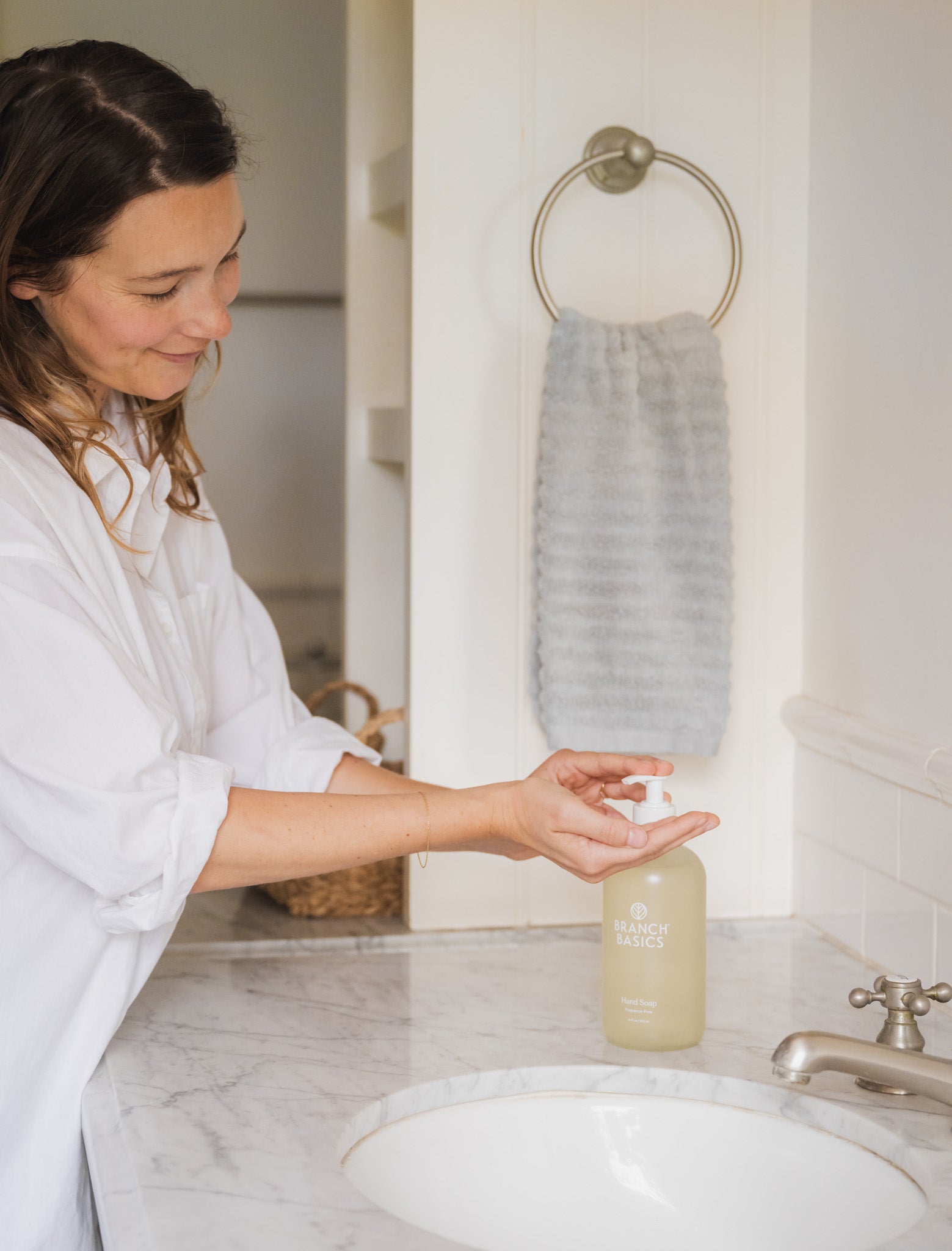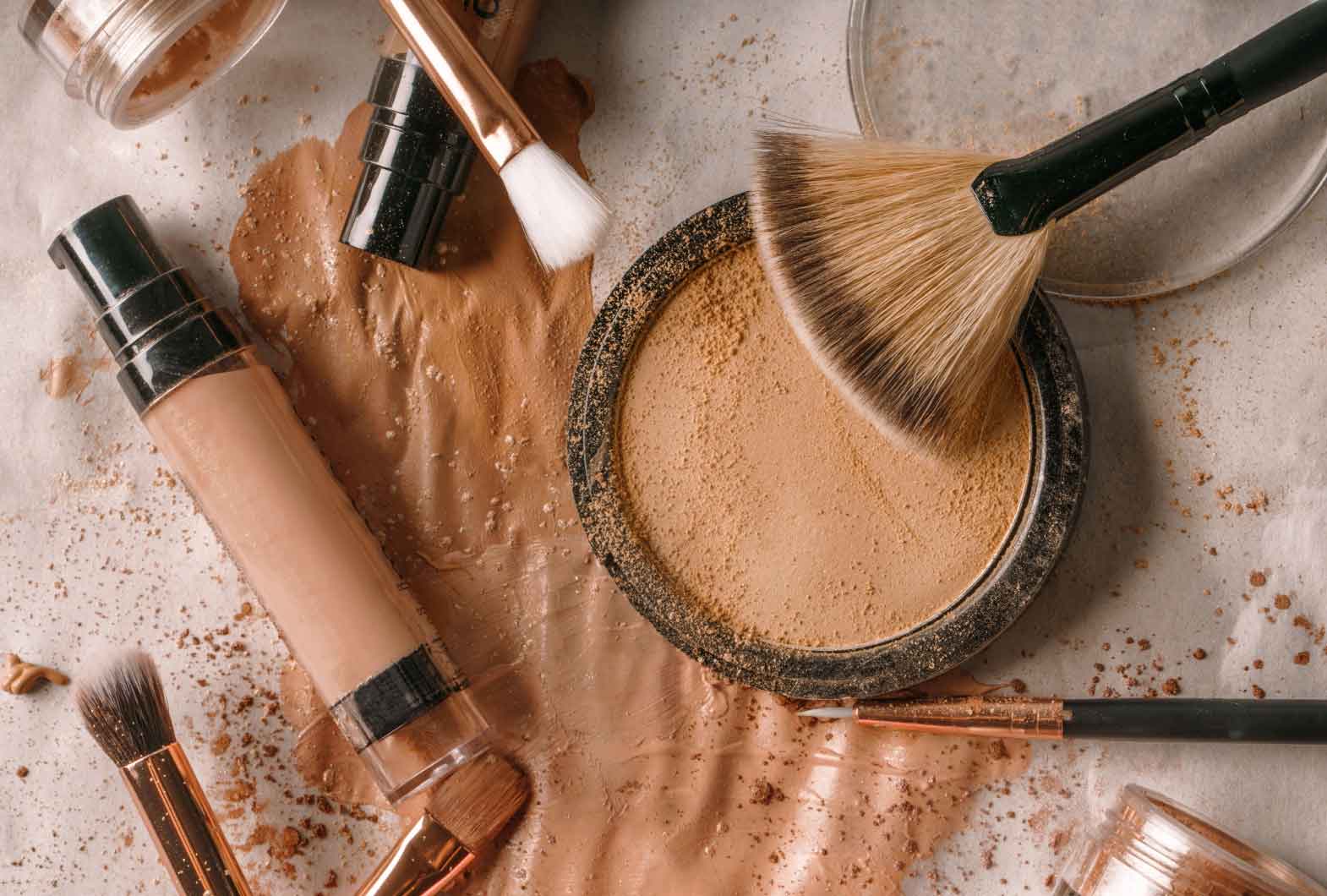How to Avoid Endocrine Disruptors in Your Daily Life

According to EWG, people come into contact with over 500 synthetic chemicals daily in their homes.1
Commercial personal care products and cleaning products typically contain Endocrine Disrupting Chemicals (EDCs), which wreak havoc on our hormones.
Yes, what you wash your clothes in, clean your kitchen with, and put on your skin all contribute to hormone health!
While this may feel overwhelming, we're going to provide you the info you need to avoid synthetic hormone hating chemicals!
What Are Endocrine Disruptors and Why Are They Harmful?
Unfortunately, our environment (inside and outside the home) is loaded with harmful chemicals that can lead to an array of hormonal symptoms. These chemicals are just about everywhere, which means our bodies are exposed to them nearly all the time.
Endocrine Disrupting Chemicals (EDCs) are environmental toxins that mimic your natural hormones, but without the benefits. EDCs can affect the ovaries, adrenals, thyroid, and other glands—causing your hormones to go completely out of whack and with a myriad of unpleasant symptoms to follow.
Additionally, endocrine disruptors have been linked to cancer, thyroid disease, birth defects, infertility, and a lowered IQ!
The Link Between Endocrine Disruptors and Estrogen Dominance
Endocrine Disruptors are able to mimic estrogen, and it's a contributing factor in estrogen dominance (a situation where there is excess estrogen in the body).
Because our environment is simply loaded with toxins, hormonal imbalances are becoming more and more common. Cases of estrogen dominance, in particular, are through the roof.
A few symptoms of estrogen dominance and other hormonal imbalance are:
- Painful periods
- Heavy periods
- Tender breasts
- PCOS
- PMS
- Persistent acne
- Digestive upset (e.g. gas and bloating)
To learn more about estrogen dominance, check out this article.
Common Endocrine Disrupting Chemicals And Where They Are Found

Bisphenol A (BPA)
BPA has been associated with cancer and well recognized as a harmful chemical.2 If you read the book Beyond the Pill (highly recommend!) you’ll learn how your environment can drive hormone imbalance and the exact steps to take to improve your health.
The book explains that BPA-free is just as concerning, because the chemicals used to replace BPA can also sabotage your health in a multitude of ways. It’s infuriating!3
BPA is commonly found in:- Receipts
- Plastic bottles and containers
- Canned foods
- Food packaging

How to avoid BPA:
- Try not to touch paper receipts
- Don’t drink out of plastic
- Do not reheat food in plastic containers or put hot food in plastic containers
- Opt for frozen food and avoid canned goods
Flame Retardants
The annoying thing about flame retardants is that their presence is not limited to couch cushions or mattresses.4
In fact, these chemicals make their way into the dust in our homes, which means we breathe them and our children and pets are disproportionately exposed to them.5
- Mattresses
- Furniture
- Pet beds
- Car seats
- Electronics
- Children’s pajamas

How to avoid flame retardants:
- Always check clothing labels. Stay away from synthetics in the kids PJ section!
- Check furniture labels
- Choose a flame retardant-free mattress
- Choose a flame retardant-free pet bed
- Use an air filter (e.g. HEPA) in your home
- Vacuum regularly
- Open windows every day to circulate fresh air

Phthalates
You might have heard of phthalates because they are commonly found in synthetic fragrance, which many are learning is a big hormonal no-no.
Phthalates are known to cause reproductive health issues. Phthalates are commonly found in:
- Personal care products
- Plastic food storage containers
- Plastic toys
- Synthetic fragrances in trash bags, diapers, and candles
- Air fresheners

How to avoid phthalates:
- Read labels—avoid products that list “phthalates” or “fragrance”
- Ditch the plastic and opt for glass
- Use essential oils instead of air fresheners
- Buy beeswax candles only
- Use laundry detergent that doesn’t contain artificial fragrance
Detoxing From Endocrine Disruptors
Waste in and waste out are two important factors when addressing detox. Here's some lifestyle and detox protocol's to fast-track your hormone healing:
If we are taking in harmful chemicals (i.e. eating non-organic foods or loading our skin and body with harmful personal care products), it is going to be difficult to harmonize our hormones.
So reducing waste in is a vital first step.6
How do we reduce waste in?
- Eat organic foods whenever possible
- Avoid synthetic endocrine disrupting chemicals in cleaning products. Use human-safe cleaning products like Branch Basics for a healthy, hormone-friendly alternative.
- Don’t eat out of plastic containers
- Don’t touch the paper receipts from the grocery store, and opt for mobile boarding passes at the airport.
Encouraging waste out is the next important piece of the EDC-detox puzzle. By eating a rainbow of organic of vegetables, we’ll be getting loads of necessary fiber, as well as nutrients that support our hormones and liver.7
This Hormone Balancing Kit includes a meal plan and recipe guide.
If you find you can’t always eat organic, use the EWG Clean 15, Dirty Dozen guide to help you make the best decision for your health. Supplementation with a few key nutrients can also support detox.
Cheers to happy hormones!
Sources:
- https://www.niehs.nih.gov/health/topics/agents/endocrine/index.cfm
- https://ntp.niehs.nih.gov/results/pubs/rr/reports/abstracts/rr04/index.html
- https://ntp.niehs.nih.gov/ntp/results/pubs/rr/reports/rr04_508.pdf
- https://www.ncbi.nlm.nih.gov/pmc/articles/PMC5989427/
- https://www.ewg.org/enviroblog/2016/08/flame-retardants-why-they-re-our-homes-and-how-avoid-them
- https://www.hopkinsmedicine.org/institute_basic_biomedical_sciences/news_events/articles_and_stories/cancer_disease/2010_08_eat_veggies.html
- https://www.sciencedaily.com/releases/2007/05/070517100315.htm
Categories

Marilee Nelson
Marilee Nelson is an Environmental Toxins expert who has spent nearly 30 years advocating for the chemically-sensitive and chronically-ill. She is a Board Certified Nutritionist, Certified Bau-Biologist and Bau-Biology Inspector and specializes in Food As Medicine. She has helped thousands of families and individuals identify, heal and recover from toxic exposures and is on a mission to revolutionize the way American families view their health.








